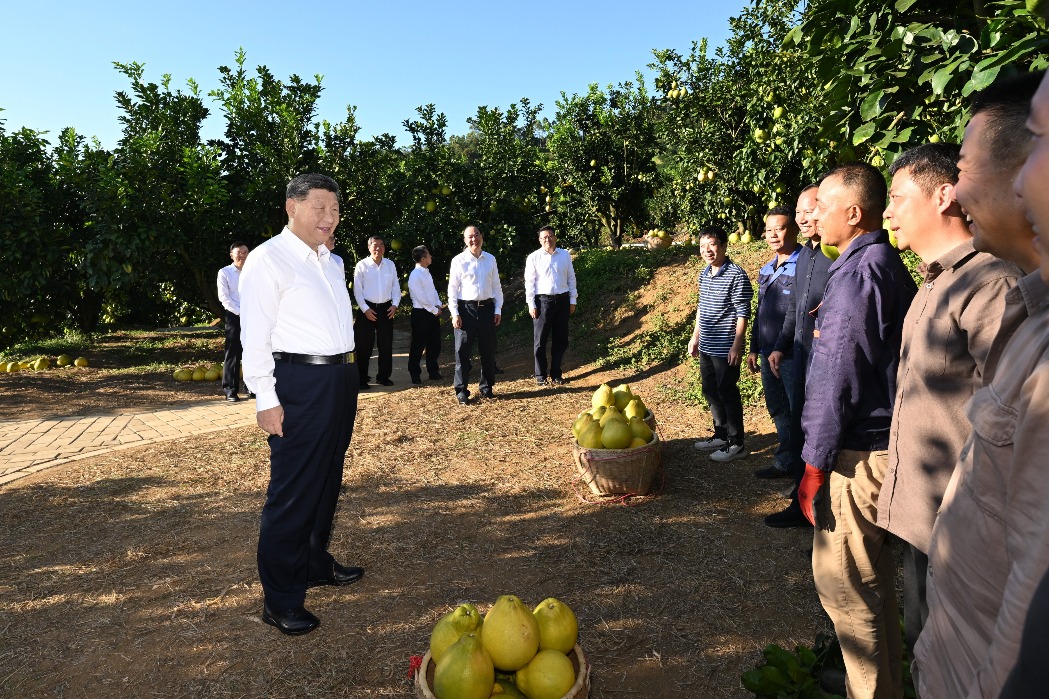Milestone summit


New platform to promote China-Arab friendly cooperation is set to lift it to fresh heights
The friendship between China and the Arab states is time-honored. The two sides have all along adhered to the principles of peace and cooperation, openness and inclusiveness, mutual learning and mutual benefit to carry out exchanges and cooperation.
Economic and trade relations have always been the "ballast stone" of the relations between China and the Arab nations. In recent years, their economic and trade cooperation has developed in an all-round way and achieved fruitful results. The first China-Arab Summit will bring new opportunities for both sides to further deepen cooperation, and promote their economic and trade relations to a new phase of high-quality growth.
Since the establishment of the China-Arab States Cooperation Forum in 2004, bilateral cooperation between the two sides has developed rapidly and yielded positive results, further developing the China-Arab relations.
First, bilateral trade in goods between the two sides has expanded rapidly. From 2004 to 2021, the total import and export volume between China and the 22 Arab countries increased from $36.71 billion to $330.24 billion, with an average annual growth rate of 13.8 percent. Last year, it hit a record high.
The two-way trade volume between China and the Arab nations in the first nine months of this year exceeded $319.2 billion, nearly equivalent to the entire amount recorded last year and representing an increase of 35.28 percent year-on-year. China has become the largest trading partner of the Arab countries.
The two sides enjoy highly complementary advantages in trade: China boasts a relatively complete and comprehensive industry system, and its exports to the Arab states are mainly finished goods. The Arab countries are rich in oil and gas resources, and they are China's largest source of crude oil imports.
In recent years, China has actively responded to the Arab nations' policy needs for economic diversification, and has continuously expanded its imports of agricultural products from these countries.
Second, China's investment in the Arab states has been on an upward trend. From 2004 to 2020, China's direct investment in the Arab countries increased from $180 million to $2.83 billion; its investment stock increased by 27 times from $760 million to $21.29 billion. China's investment involves increasingly diversified fields, covering oil and gas, new energy, construction, manufacturing, the digital economy, healthcare and more. By the end of 2021, China had inked bilateral investment agreements with 14 Arab countries and agreements on avoidance of double taxation with 12 Arab nations.
Third, China is expanding its infrastructure projects and contracting business in the Arab countries. The newly signed contract amount and completed turnover of contracted projects increased from $4.13 billion and $2.16 billion in 2004 to $22.7 billion and $29.33 billion in 2020, respectively.
Chinese enterprises have actively participated in engineering projects in various fields in the Arab countries, such as transportation, public facilities, clean energy, information and communication, and industrial facilities.
They have undertaken a large number of key projects, such as the Mecca light rail in Saudi Arabia, the Lusail Stadium in Qatar, and a solar plant project at Benban Solar Energy Park in Egypt, which have contributed to local economic and social development and the improvement of people's livelihoods.
Fourth, China has always firmly supported the Arab states' national independence and social and economic growth. Since the 1950s and 1960s, the former has insisted on providing financial and technical assistance to help the latter develop infrastructure, agriculture, health, education and other sectors related to people's well-being, while actively extending humanitarian assistance to those Arab countries.
After the outbreak of the COVID-19 pandemic in 2020, China joined hands with all the Arab nations to fight the pandemic, and offered anti-virus assistance and cooperation in the health sector, which became the latest witness of the friendship and development of cooperation between the two sides. By June 2022, China had provided 330 million vaccine doses to 17 Arab countries and the League of Arab States Secretariat.
Although affected by the anti-globalization trend and the pandemic, as well as the complex and volatile international landscape and geopolitical game, the political mutual trust between China and the Arab countries is still growing.
The first China-Arab Summit will certainly further enhance the comprehensive strategic friendship between the two sides and draw a new blueprint for future China-Arab cooperation.
Looking to the future, China and the Arab nations should work together to make more efforts in the following aspects so as to further promote their high-quality economic and trade cooperation.
First, China and the Arab states should vigorously advance their negotiations on the China-Gulf Cooperation Council free trade agreement and speed up the construction of the China-Gulf Cooperation Council Free Trade Area, thus creating broader space for trade and investment between China and the Arab countries.
Second, the trade structure should be further optimized. The resources of China and the Arab countries are highly complementary, and the foundation for trade is solid. Energy will remain an important part of China-Arab trade. In the meantime, there is still much potential for industrial cooperation and agricultural trade between the two sides. Therefore, they should further strengthen cooperation on trade facilitation and strive to expand trade in a balanced manner.
Third, taking the economic transformation and development of the Arab countries as an opportunity, Chinese enterprises have a good opportunity to increase investment in the key manufacturing industries of some Arab nations, and explore new investment and cooperation opportunities in the digital economy, such as cross-border e-commerce and smart cities, as well as in high-tech fields such as artificial intelligence and bio-pharmaceuticals.
Fourth, the Arab countries still face large gaps in infrastructure construction such as power supply, new energy development, transportation facilities and housing construction. Chinese enterprises need to continuously improve their competitiveness, actively follow the integrated development path of "construction-investment-operation", and help them fully cultivate the local market.
Fifth, the Chinese and Arab governments should strengthen exchanges and consultations in the economic and trade field, jointly promote the signing of agreements on bilateral investment protection and double taxation avoidance, and create a favorable policy and business environment for bilateral investment and cooperation. Meanwhile, the two sides should continue to strengthen exchanges and cooperation in the financial field and provide more convenient services and diversified financing support for economic and trade cooperation.
The author is the vice-president of the Chinese Academy of International Trade and Economic Cooperation under the Ministry of Commerce. The author contributed this article to China Watch, a think tank powered by China Daily. The views do not necessarily reflect those of China Daily.
Contact the editor at editor@chinawatch.cn.

































